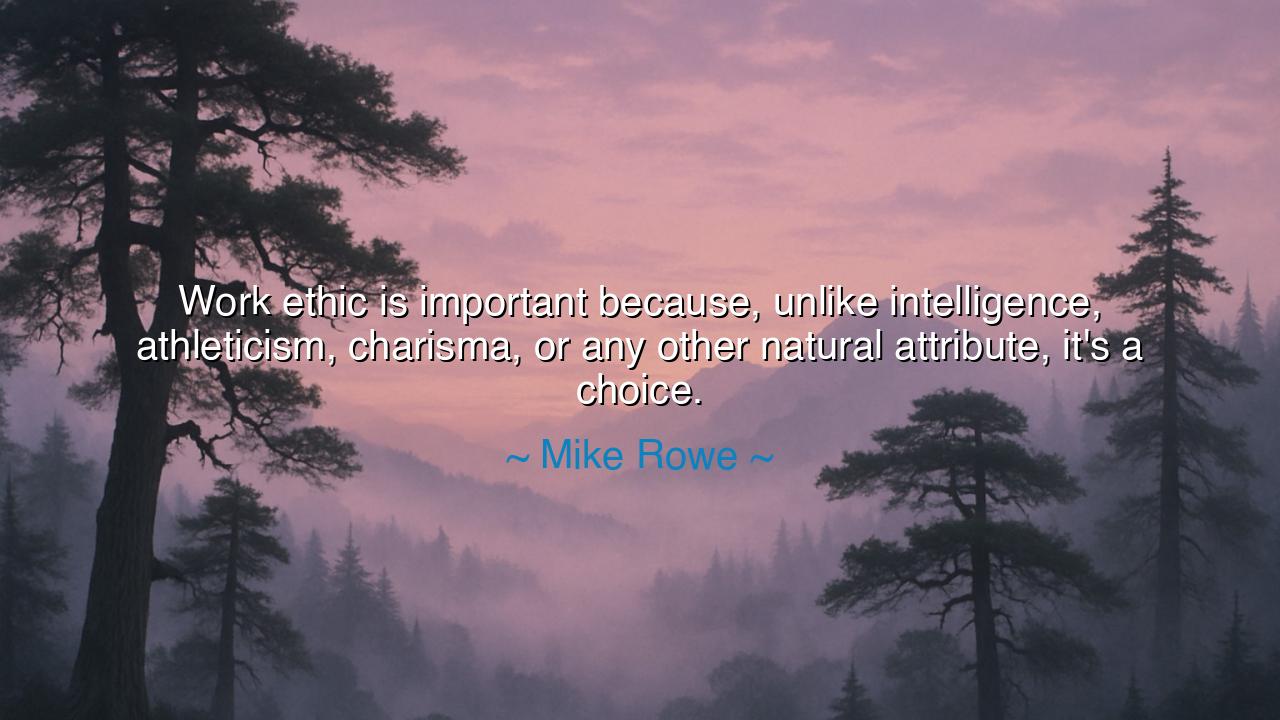
Work ethic is important because, unlike intelligence
Work ethic is important because, unlike intelligence, athleticism, charisma, or any other natural attribute, it's a choice.






The Power of the Chosen Path
In the steadfast and grounded words of Mike Rowe, a man who has walked among the laborers and honored the dignity of work, we find a truth that shines like iron struck in fire: “Work ethic is important because, unlike intelligence, athleticism, charisma, or any other natural attribute, it's a choice.” This is not the language of privilege or theory—it is the wisdom of sweat, of calloused hands and sleepless effort. Rowe speaks to the eternal difference between what is given and what is earned. For though some are born gifted, none are born with discipline. Work ethic is the crown of the self-made, the virtue that transforms the ordinary into the extraordinary.
The meaning of this quote is simple yet profound: while nature endows some with brilliance or beauty, strength or charm, the choice to labor with purpose belongs to every human being. Talent may open the first door, but work ethic builds the house. Intelligence may guide the mind, but effort tempers the will. The great error of the modern age is to believe that success belongs only to the gifted; Rowe reminds us that true greatness belongs to the determined. For what we choose defines us far more than what we inherit. The gods may give ability, but the soul forges character through choice.
The origin of Rowe’s words lies in his journey through the unseen heart of his nation—the workshops, the farms, the factories, and the fields. As the host of Dirty Jobs, he walked among men and women who labored unseen yet held the world together through the strength of their hands. He saw mechanics who rose before dawn, miners who dug through darkness, and builders who bore the weight of cities. These were not people celebrated for genius or charisma, yet they possessed something rarer: work ethic—the decision, renewed each day, to give their best regardless of comfort or acclaim. It was this daily choice, humble yet mighty, that inspired Rowe to call it the true measure of intelligence, for it is self-created rather than inherited.
History bears countless examples of this truth. Consider Thomas Edison, the tireless inventor who once said, “Genius is one percent inspiration and ninety-nine percent perspiration.” He failed more than a thousand times before creating the electric light. The world saw a man of genius; Edison saw only the fruit of relentless effort. His success was not the product of gifted intellect alone, but of unyielding work ethic—the decision, again and again, to persist where others surrendered. Or think of Abraham Lincoln, born in poverty, self-educated by the flicker of a candle, who rose to lead a nation through its darkest hour. His triumph was not the work of fate, but of perseverance chosen daily.
In the wisdom of the ancients, this same truth was revered. The Stoic philosophers taught that virtue is the one thing fully within human control. A man cannot choose the shape of his body or the sharpness of his mind, but he can always choose how he labors, how he endures, and how he strives. Work ethic, then, is not merely diligence—it is the manifestation of will. It is the act of aligning oneself with purpose, of saying, “I will rise when I might rest; I will continue when I might quit.” Such resolve is not given by nature but born of the spirit. It is the mark of the awakened soul—the one who knows that destiny is not found, but forged.
Yet Rowe’s teaching carries not just praise, but challenge. For if work ethic is a choice, then idleness is too. No man may blame fate for his inaction, nor talent for his mediocrity. The one who labors with consistency, even without brilliance, surpasses the gifted who do not act. The field honors not the seed with the best potential, but the farmer who tills the soil. The world remembers not the dreamers who never began, but the doers who persisted despite their limits. Thus, work ethic becomes a moral law of life—it rewards all who embrace it and humbles all who neglect it.
Therefore, O seeker of greatness, let this teaching be carved upon your heart: choose effort over ease, diligence over chance, perseverance over pride. Do not envy those who are born with gifts; envy instead the one who refuses to waste a single day. Rise early, labor well, and treat your work—whatever it may be—as a sacred act. For in every honest task, the soul is shaped and strengthened. When you give yourself fully to your labor, you participate in the ancient rhythm of creation itself. And when your time comes, you will know you did not live by what you were given, but by what you chose to become.
For that is the essence of work ethic—not inherited talent, but the decision to rise each day and build your worth with your own hands. It is the quiet power that moves mountains, the invisible strength that outlives talent and triumph alike. And in choosing it, you become not merely a worker, but a creator—one who proves, with every act of effort, that the truest intelligence lies not in the mind alone, but in the will to persist.






AAdministratorAdministrator
Welcome, honored guests. Please leave a comment, we will respond soon